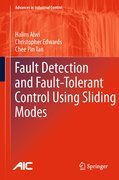
Fault detection and fault-tolerant control using sliding modes
Alwi, Halim
Edwards, Christopher
Tan, Chee Pin
Fault Detection and Fault-tolerant Control Using Sliding Modes is the first text dedicated to showing the latest developments in the use of sliding-mode concepts for fault detection and isolation (FDI) and fault-tolerant control in dynamical engineering systems. It begins with an introduction to the basic concepts of sliding modes to provide a background to the field. This is followed by chapters that describe the use and design of sliding-mode observers for FDI using robust fault reconstruction. The development of a class of sliding-mode observers is described from first principles through to the latest schemes that circumvent minimum-phase and relative-degree conditions. Recent developmentshave shown that the field of fault tolerant control is a natural application of the well-known robustness properties of sliding-mode control. A family of sliding-mode control designs incorporating control allocation, which can deal with actuator failures directly by exploiting redundancy, is presented. Variousrealistic case studies, specifically highlighting aircraft systems and including results from the implementation of these designs on a motion flight simulator, are described. A reference and guide for researchers in fault detection and fault-tolerant control, this book will also be of interest to graduate students working with nonlinear systems and with sliding modes in particular. Advances in Industrial Control aims to report and encourage the transfer of technology in control engineering. The rapid development of control technology has an impact on all areas of the control discipline. The series offers an opportunity for researchers to present an extended exposition of new work in all aspects of industrial control. Shows the reader how to use sliding-mode control to provide fault tolerance in nonlinear systems using a model-reference framework. Case studies show how sliding-mode methods can be used in aeronautical systems for increased reliability and safety. Written by experts. INDICE: Introduction. Fault Detection and Isolation and Fault-tolerant Control. First-order Sliding-mode Concepts. Sliding-mode Observers for Fault Detection. Cascaded Sliding-mode Observers. Sensor Fault Detection. Adaptive Sliding-mode Fault-tolerant Control. Fault-tolerant Control using Sliding Modes with On-line Control Allocation. Model-reference Sliding-mode FTC. SIMONA Implementation Results. Case Study I: GARTEUR AG16, El Al Flight 1862 Bijlmermeer Incident. Case Study II: Propulsion-controlled Aircraft.
- ISBN: 978-0-85729-649-8
- Editorial: Springer London
- Encuadernacion: Cartoné
- Páginas: 358
- Fecha Publicación: 18/07/2011
- Nº Volúmenes: 1
- Idioma: Inglés
